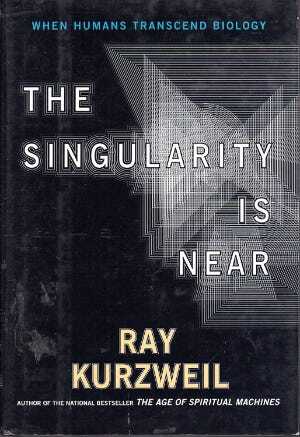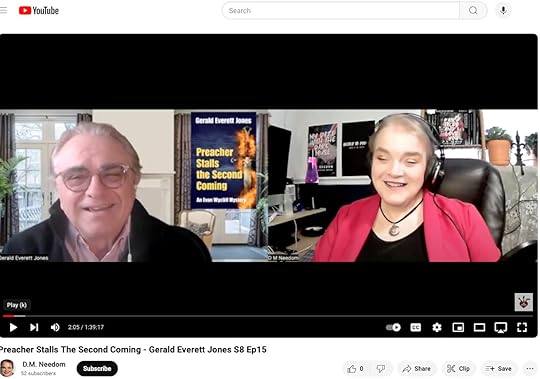Gerald Everett Jones's Blog: Gerald Everett Jones - Author, page 14
August 11, 2024
Bizgig Survival Talk with Mike Fallat

Mike’s introRead more about Mike’s mission and this episode.
Today, we’re diving headfirst into the labyrinth of the gig economy with none other than Gerald Everett Jones. If you’ve ever felt like a modern-day nomad navigating the ever-shifting sands of freelance work, this episode is your survival guide. Gerald, the brain behind “White-Collar Migrant Worker: Making Your Way in the Gig Economy,” lays the blueprint for thriving in a world where stability is a myth and adaptability is king.

Mike says
Gerald Everett Jones isn’t just a guest; he’s a mentor, a guide, and a beacon for anyone navigating the gig economy. His book “White-Collar Migrant Worker: Making Your Way in the Gig Economy” is more than a read—it’s a roadmap. So, grab your copy, find your voice, and let’s make some noise in this gig economy.

Also available as an audiobook
About MikeMike Fallat, aka The BookMan, is the owner of Dreamstarters Publishing and the Million Dollar Book Agency. They have helped 300+ entrepreneurs become bestselling authors. His goal is to help 1,000 entrepreneurs publish books and teach them how to use their books as a gateway to generating 7-figures.
Visit his website for more information:
https://www.milliondollarbookagency.com/

The LaPuerta Books and Media website has more information on the five books in the White Collar Migrant Worker series.
Feed your curiosity with a paid subscription to this Thinking About Thinking blog. With a paid subscription ($5 / month or $30 / year), you’ll gain access to all the content that’s here, including podcasts, and you’ll be helping us build our worldwide community through storytelling and self-expression.
Mick & Moira & Brad - Audiobook

Tuesday, August 13: Chapter 1 - Courtly Maneuvers
Narrated beautifully by Erin Alexis.
Audiobook episodes will post on Tuesdays, Thursdays, and Saturdays at 5am US Eastern Time - from August 13 to November 2. Paid subscribers to the Thinking About Thinking blog posts get all 36 episodes at no extra charge - including episodes already posted - in the site Podcasts tab (or on Apple, Spotify, and other distros). All subscribers will receive the next week’s release schedule on Sunday evenings.
Brad urgently awaits Moira for a high-stakes meeting at the Century Club. Their tennis match against the influential Botheralls doubles as a business strategy. Despite Moira's internal conflict between loyalty and talent, they orchestrate a calculated game, blurring the lines between skill and deceit.
Thursday, August 15: Chapter 2 - Tactical TablesBrad orchestrates a strategic dinner, blending business and social maneuvers. Moira navigates the evening's complexities, balancing her role in the charade while confronting Brad's manipulative tactics. Their conversation exposes tensions and underlying motives, hinting at deeper conflicts ahead.
Saturday, August 17: Chapter 3 - Threads of DecisionsMoira contemplates reconciling with Brad while shopping for silk pajamas. Her friend Lana offers advice, highlighting Moira's conflicted feelings about her relationship. Meanwhile, Moira's encounter with Mick at the tailor's shop leads to a humorous exchange, revealing insights into both characters' insecurities and self-perceptions.
Feed your curiosity with a paid subscription to this Thinking About Thinking blog. With a paid subscription ($5 / month or $30 / year), you’ll gain access to all the content that’s here, including podcasts, and you’ll be helping us build our worldwide community through storytelling and self-expression.
August 7, 2024
Book Review: 'The Singularity Is Nearer' by Ray Kurzweil
Ray Kurzweil’s recent book The Singularity Is Nearer: When We Merge with AI (Viking, June 2024) updates his previous work, The Singularity Is Near: When Humans Transcend Biology (Viking, 2005). Perhaps the world’s foremost AI researcher, the author is perhaps best known as the brand name on rock-band keyboards. He pioneered the digital sampling of musical instruments so that those sounds could be generated (synthesized) at the press of a key - not just played back as recordings. He was also an early developer of optical character recognition (OCR) and voice synthesis.
He now heads up AI research at Google.

Not only closer than you’d think - closer than you may be able to believe!

This one was incredible enough.
August 4, 2024
Our Mysterious Moon
There is no reason in astronomy or in astrophysics why this should be so. The coincidence of this “perfect fit” is statistically extremely unlikely.
Isaac Asimov called it the sheerest of coincidences:
The oddity of the Moon’s convenient diameter - and the solar eclipse peculiarly - and highly coincidentally the Moon’s diameter - combined with its distance from Earth allows our sister world to perfectly blot out the Sun during a solar eclipse. This is just another one of those oddities, it seems, because no other planet in our solar system has a moon that will do this anywhere nearly so perfectly, and there are hundreds of such moons. There is no astronomical reason why the Sun and the Moon should fit so well. It is the sheerest of coincidences, and only the Earth among all the planets is blessed in this fashion.
Until I listened to these podcasts, I’d had no idea this question has been such an active subject of debate among scientists.
August 1, 2024
In times of stress, have a 'good wheeze'

Like a wise parent who never scolds, Jeeves warns Bertie the consequences of his jokes could be unintended and dire, then dutifully cleans up afterward.
July 28, 2024
Jesus in Alexandria
The late esoteric teacher Roger Weir was a lifelong student of philosophy, history, and science. Although a prolific lecturer, he wrote only a few books, which hardly cover the breadth of his work. I took his course on The Hermetica, which he gave at the Philosophical Research Society in Los Angeles years ago. Before he passed away in 2018, he gave a two-year series of lectures at the Bodhi Tree Bookstore in West Hollywood.
From the earliest days I knew him, he claimed to have written a 300-page manuscript titled Jesus in Alexandria. As far as I know, the book was never published. A paperback, The New Aion, includes the title in its compilation, but the text is simply the transcript of his lecture.
He said he’d been intrigued by notions that the “lost years” of Jesus (from adolescence to age thirty) were spent in India. However, after years of diligent research, Weir concluded that Jesus practiced healing arts among the Therapeuti of Alexandria, a Jewish cult associated with the Essenes, the group visited by the ancient historian Philo. Weir believed that St. Thomas then carried those teachings to India and founded churches there, which was the origin of the Malankara Orthodox Syrian Church (Indian Orthodox Church). Further evidence of this contact, according to Weir, was the emergence of Mahayana from traditional Buddhism, which took place in the first century AD and shows the influence of what Weir termed Hellenistic Judaism.
And from those origins comes much of what people today know as New Age philosophy, many with no awareness of its roots.
The Shared Presence Foundation (sharepresence.org) has captured Weir’s legacy, and many of his lectures are available as streaming audio or video on the website. Below is a link to one of his lectures on Jesus in Alexandria.
Weir’s thinking was exceptionally fluid, and at times he seems to free-associate, flitting from one topic to another. Yet he almost always comes back to his point. In some of my interviews I’ve posted here, I’ve been accused of the same behavior, which can be either annoying or intriguing. I offer no apologies.
So do be patient and open your ears. Weir can be both baffling and fascinating.

Thinking About Thinking is a reader-supported publication. To receive new posts and support my work, consider becoming a free or paid subscriber.
July 21, 2024
TT025 Thoughts on Revisiting The Handmaid's Tale
When Atwood wrote this dystopian novel in 1985, the prospects of a Christian national state and dictatorship seemed remote. Not anymore.

The time is now! In staged event to promote release of the streaming series “The Handmaid’s Tale” on Hulu in April of 2017, red-robed nuns paraded on the USC campus during the Los Angeles Times Festival of Books (GEJ photo).
Discussion with D. M. Needom, Host of 'Better to Podcast'

Click here to view on YouTube. Or here for the podcast. Yes, we talk about the suspenseful story of Preacher Stalls the Second Coming and also its themes of cults, religion, and the politics of fear.

Fourth in the award-winning mystery series.
Feed your curiosity with a paid subscription to this Thinking About Thinking blog. With a paid subscription ($5 / month or $30 / year), you’ll gain access to all the content that’s here, including podcasts, and you’ll be helping us build our worldwide community through storytelling and self-expression.
July 19, 2024
Margaret Atwood and the Politics of Fear
Many thoughtful people these days are wondering out loud why electorates - not only here but in many other countries - seem to be craving authoritarian leaders. The election-year conversation in the US often points to immigration and inflation as issues that motivate this movement.
But I submit that the root cause is more basic: People the world over are afraid. Continual fear triggers daily anxiety, and people demand relief.
Just make the bad things go away! And I don’t care how you do it!
But why is everyone so fearful now? I’d say it’s because, with the deluge of information in our interconnected world, there are today more reasons to fear the demise of the human race than ever. And if we’re paying attention to our phones (who isn’t?), we get those messages all day long.
When I was in elementary school, there was one major fear of cataclysm - worldwide nuclear war. That one hasn’t gone away. But added to the list now are climate crisis, wildlife extinctions, food insecurity and contamination, supply-chain disruptions, cyber attacks, multiple asymmetrical regional wars, potential racial and cult conflicts, mass shootings… and I doubt I’ve listed them all.
Worried? Take your pick.
Before she was a published author, Margaret Atwood was a professor of English. However, she has also been a diligent student of history. I rather think that she modeled the character Tony in her novel The Robber Bride on herself. Tony is a professor of military history - specifically, seige techniques of the Middle Ages. This sense of what literary theorist Linda Hutcheon calls historiographic metafiction informs all of Atwood’s work.
So here’s my book review, which dates from April of 2017 when the Hulu streaming series was released:
June 30, 2024
Mick & Moira & Brad - Audiobook Release

Google Play link $9.95 promoHere’s five minutes for your first sip, read by the lovely Erin Alexis.
 Also available onMore Google Play audiobook deals
Also available onMore Google Play audiobook deals

Hint: You’ll also find the Preacher Finds a Corpse audiobook here on the Bonus Audiobook Episodes tab - free with your $5 monthly subscription to this Thinking About Thinking blog.
Feed your curiosity with a paid subscription to this Thinking About Thinking blog. With a paid subscription ($5 / month or $30 / year), you’ll gain access to all the content that’s here, including podcasts, and you’ll be helping us build our worldwide community through storytelling and self-expression.



